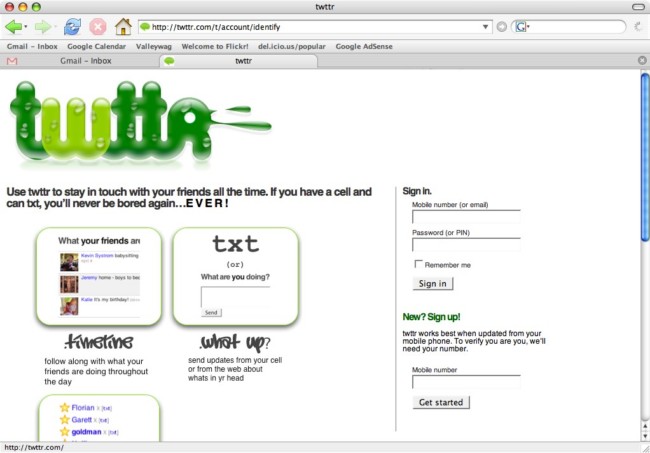Technology Category
Independent news, views, opinions and reviews on the latest gadgets, games, science, technology and research from Apple and more. It’s about the technologies that change the way we live, work, love and behave.
New 3D Zebra Crossing has drivers in Iceland on high alert
Mind the gap when crossing the road in Ísafjörður, Iceland, where the usual zebra-crossing has been given a third dimension by street painting company Vegi GÍH and the city’s environmental commissioner Ralf Trylla. The idea is to promote art and make drivers pay more attention when approach the crossing.
Given the sensational scenery in Iceland, the zebra might be necessary in keeping drivers’ eyes on the road.
Spotter: Iceland Magazine, Swissmiss
Posted: 26th, October 2017 | In: Politicians, Strange But True, Technology | Comment
A flame-activated edition of Ray Bradbury’s Fahrenheit 451
The Anne Petronille Nypels Lab at Holland’s Van Eyck Academie showcases the work of French graphic design collective Super Terrain. They’ve created a version of Ray Bradbury’s Fahrenheit 451 in heat sensitive ink. At room temperature the book’s text is secreted under a layer of black substance. Heat it up and the words are revealed.
Spotter: Open Culture, Flashbak
Posted: 22nd, October 2017 | In: Books, Technology, The Consumer | Comment
Organic farming wastes resources and what about the animals?
We should all care where meat comes from. Poor animal welfare shames us all. Writing in the Guardian, George Monbiot has an idea:
One study in Britain suggests that, if we stopped using animal products, everyone in Britain could be fed on just 3m of our 18.5m hectares of current farmland (or on 7m hectares if all our farming were organic).
Organic is wasteful, then, right? And if we stop using animal product, where does the fertiliser for organic come from?
The study Monbiot cites is in the Land Magazine. You can read it there, and then know that according to the Soil Association, “Organic means…no manufactured herbicides or artificial fertilisers.”
Poo it is, then. We need farm animals. But we can all agree they must be well treated. Anything less is a curse on our age.
Posted: 21st, October 2017 | In: News, Technology, The Consumer | Comment
Anyone with a 3D printer can make your keys from a photo
In the file marked ‘What could go wrong?’ we slide Dave Pedu’s Openscad model capabale of producing a Kwitset key from a photo. All you need is a 3D printer and your house-key can be duplicated.
Rather than simply duplicating an existing key, [Dave] created a parametric key blank in OpenSCAD; he just enters his pin settings and the model generator creates the print file. He printed ABS on a glass plate with a schmeer of acetone on it, and .15mm layer heights. Another reason [Dave] chose Kwikset is that the one he had was super old and super loose — he theorizes that a newer, tighter lock might simply break the key.
So, a reminder: Don’t post a picture of your keys on the socials since at this point it’s certainly possible to script the entire process from selecting a picture to pulling the key off the print bed.
Expect criminals to be nicking 3D printers some day soon…
Posted: 15th, October 2017 | In: Technology | Comment
Inside China’s censorship factories
To the Wisdom Mountain Twin Towers in China’s Tianjin city, where the bright young things are cleansing the internet of words and images the State would rather you did not see. The Chinese government often outsource censorship to British students private companies, like Toutiao, which raised $2B in capital markets. These companies are recruiting prim minds to uphold moral values and restrict your view of the world and the people around you.
And you won’t hear the West complain, not as long as the Chinese keep paying for our acquiescence. In August, under pressure of an academic boycott, Cambridge University Press reinstated over 300 articles it removed from its prestigious China Quarterly journal at the behest of the Chinese authorities. The Chinese State wants facts erased the world over:
Zhang Lijun, chairman of the online news and video portal V1 Group, said that between 20 and 30 per cent of his company’s labour costs went on content auditors – a necessary business expenditure.
“Without doubt you need to maintain close ties with the ruling party,” Zhang said. “Party building, setting up party units properly, these can ensure your news goes out smoothly and keeps your business operations safe.”
The Beijing-based censor said Toutiao used artificial intelligence systems to censor content, though these don’t always understand the tone of posts.
“We are training the AI. They are not as smart. Hopefully they will learn to handle all this eventually.” For now, though, real humans are still in demand.
An advertisement Toutiao posted on Tianjin Foreign Studies University’s career page for students this month sought 100 fresh graduates to work in “content audit”, earning between 4,000-6,000 yuan ($611-$917) per month.
Spotter: SCMP
Posted: 13th, October 2017 | In: News, Technology | Comment
If you can pay the fee Facebook will hook you up with ‘Jew haters’
Thanks to ProPublica, we know that you can book adverts on Facebook that target anti-Semites. Most Facebook user of would ignore these ads, of course. Active Nazis are thin on the ground. And as the Jewish joke goes, “If anyone was going to hate us, thank God it’s the Arabs.” But Jew hating is increasingly popular. I am amazed and disappointed that here isn’t more outrage about rising anti-Semitism.
Propublica, whose stated mission is “to expose abuses of power and betrayals of the public trust by government, business, and other institutions, using the moral force of investigative journalism to spur reform through the sustained spotlighting of wrongdoing” has Facebook in its crosshairs.
ProPublica says:
Want to market Nazi memorabilia, or recruit marchers for a far-right rally? Facebook’s self-service ad-buying platform had the right audience for you. Until this week, when we asked Facebook about it, the world’s largest social network enabled advertisers to direct their pitches to the news feeds of almost 2,300 people who expressed interest in the topics of “Jew hater,” “How to burn jews,” or, “History of ‘why jews ruin the world.’”
All this stuff exists offline. And thanks to the internet, readers and collectors of such racist nonsense can be monitored – all 2,300 of them in the gigantic Facebook ecosystem. I’d argue that if Facebook – owned by a Jew – can take their money, then good for them. Free speech and free thought are cornerstones of democracy. If people want to talk about hating Jews and conspiracy theories, let them.
So ProPublica paid £30 for “promoted posts” targeted at those Jew-hating Facebookers.
In all likelihood, the ad categories that we spotted were automatically generated… Facebook’s algorithm automatically transforms people’s declared interests into advertising categories.
Which begs the question: who programmed the computer?
Rob Leathern, product management director at Facebook, has issued the following statement:
“We don’t allow hate speech on Facebook. Our community standards strictly prohibit attacking people based on their protected characteristics, including religion, and we prohibit advertisers from discriminating against people based on religion and other attributes. However, there are times where content is surfaced on our platform that violates our standards. In this case, we’ve removed the associated targeting fields in question. We know we have more work to do, so we’re also building new guardrails in our product and review processes to prevent other issues like this from happening in the future.”
Of course, hate speech is free speech. That doesn’t mean you should set out to assault and intimidate people. It means you are free to say what you want and for it to be freely debated in public. Calling something hateful is too-often used to shut down free expression. So what did Facebook do wrong?
Ira Glasser, a former executive director of the American Civil Liberties Union, now president of the board of directors of the Drug Policy Alliance, nails it:
How is ‘hate speech’ defined, and who decides which speech comes within the definition? Mostly, it’s not us. In the 1990s in America, black students favoured ‘hate speech’ bans because they thought it would ban racists from speaking on campuses. But the deciders were white. If the codes the black students wanted had been in force in the 1960s, their most frequent victim would have been Malcolm X. In England, Jewish students supported a ban on racist speech. Later, Zionist speakers were banned on the grounds that Zionism is a form of racism. Speech bans are like poison gas: seems like a good idea when you have your target in sight — but the wind shifts, and blows it back on us.
You want to have official endoresment of what can be said? Surely not.
As for Facebook, well, it’s not a public service. It’s a profit-making company not a moralising force for spiritual salvation.
Posted: 15th, September 2017 | In: Key Posts, News, Technology | Comment
9/11 from Space
On September 11, 2001, astronaut Frank Culbertson saw the destruction of New York City’s Twin Towers from the International Space Station. He wrote: “It’s horrible to see smoke pouring from wounds in your own country from such a fantastic vantage point. The dichotomy of being on a spacecraft dedicated to improving life on the earth and watching life being destroyed by such wilful, terrible acts is jolting to the psyche, no matter who you are.”
Posted: 11th, September 2017 | In: Strange But True, Technology | Comment
Uganda vows to attack gays with a ‘homos’-sniffing machine
The Ugandan government is on the look out for homosexuals. Helping it to detect “homos and porn actors, especially those misusing applications like Whatsapp with sex acts” is a gadget imported from South Korea – that’s the country exporting porno fridges.
The machine was ordered last year. It’s just been delivered, reportedly. But who ordered it? And does it work?
In 2016, Uganda’s Red Pepper newspaper spoke with Father Simon Lokodo, the country’s Minister of Ethics and Integrity. Red Pepper is the Ugandan tabloid that in 2014 named the country’s “200 top homosexuals”, a day after President Yoweri Museveni signed into law a bill toughening penalties for gays: a fine of UGX 10 million ($3000) or up to 10 years in jail, or both.
The paper has an enthusiastic interest in gay sex.
The story began with a photo of the gay-hunting politician underscored with the caption, “Homos Want To Rape Me – Fr. Lokodo.” Readers were told:
The amiable man of God, who quit priesthood after being appointed minister in 2011, told Red Pepper in an exclusive interview that ever since he waged a war on homosexuality, shameless homos have decided to fight back by insulting him with gay sex advances. Lokodo’s most recent brush with the bum-drillers happened last week when — together with police — he stormed and foiled a gay pride parade that was being planned at Kabalagala in Kampala city.
Thoughts soon turn to the gay-detecting machine. Lokodo explained his “war” on homosexual love:
“We are going to attack and attack. I have fresh tactics. One of them is a censor gadget or machine. We are going to procure this machine and it will detect homos and porn actors especially those misusing applications like WhatsApp with sex acts. The South Koreans are programming it. And very soon we will ship it into the country and all the evil will be busted.
How the machine works, we don’t know. Perhaps the machine works a bit like the mysterious E-meter, the Scientology device, which, according to that group “does nothing. It is an electronic instrument that measures mental state and change of state in individuals and assists the precision and speed of auditing.” But does nothing.
TechZim has a theory about the G-meter.
The machine will detect pornographic pictures, videos or graphics taken or saved on phones, computers or cameras…. How does the pornography detection machine work though? This machine is not the first attempt at detecting porn on devices. There are several products already available, the Paraben Porn Detection Stick being an example. The Stick uses advanced image analysing algorithms to identify facial features, flesh tones and body parts that are potentially pornographic among other things.
The Stick actually works to a certain extent. It errs on the side of over-zealousness as it flags normal photos as pornographic more frequently than the opposite. The Stick however only scans for images and not videos which are harder to scan. Uganda’s machine does both, which it should at $88,000 because the Paraben Porn Detection Stick costs around $129.
Worryingly, the machine can also tap Virtual private networks (VPNS).
An interesting tidbit about the machine’s technology is that it can trace traffic from VPNs and proxy networks such as Tor. With such leads, they can they block the nodes routing traffic from the VPNs in question.
This means that we are unlikely to see a repeat of what happened during the social media blackout that was instituted in February during election time, when VPN clients were downloaded 1.5 million times to bypass restrictions.
Here’s the anti-porn committee being sworn in:
Worrying stuff.
Posted: 9th, September 2017 | In: Key Posts, News, Politicians, Technology | Comment
Tim Cook and Apple beat the principal-agent problem
Apple shares are soaring. The iPhone remains the best and most desirable phone on the market. And with success comes money.
Tim Cook, the chief executive of Apple, has collected $89.6m as part of a 10-year deal that he signed as an incentive to keep the iPhone maker at the forefront of the technology industry after he took over the reins in 2011 from company co-founder Steve Jobs.
The stock package awarded to Cook in 2011 was originally valued at $376m, but is now worth much more because Apple shares have increased by six-fold since he signed the deal.
Apple Insider has more:
If Apple’s performance fell in the middle third of the S&P 500, Cook’s RSU award would have been reduced by half. Cook would have collected nothing if Apple stock finished in the bottom-third.
Apple and Cook are bound.
The principal–agent problem, in political science and economics, (also known as agency dilemma or the agency problem) occurs when one person or entity (the “agent”) is able to make decisions on behalf of, or that impact, another person or entity: the “principal”. This dilemma exists in circumstances where agents are motivated to act in their own best interests, which are contrary to those of their principals, and is an example of moral hazard.
Meanwhile, over at the Guardian, which repeats the story of Cook’s earnings from a newswire feed without mention of the penalties Cook faced for missing targets:
The Guardian has confirmed losses of £69m for the last financial year but said it was making significant progress in its membership scheme, with more than 50,000 people paying to sign up.
At least the newspaper now is trying to produce a viable business, asking readers to donate (no, not to pay, as the Times does):
The new editor of The Guardian is to be paid tens of thousands less than her male predecessor, according to figures published by the newspaper group.
Katharine Viner received a salary of £340,000 for 2014-15, putting her basic earnings well behind the £395,000 handed to Alan Rusbridger, whom she replaced last month as editor-in-chief of the paper.
Taking into account Mr Rusbridger’s other payouts from the group, where he was editor for two decades, the former newspaper boss took home £492,000 over the past year, £152,000 more than his successor.
And for his last seasons in charge:
The revelation of the pay gap came as Guardian News and Media, the publisher of The Guardian and The Observer, reported an underlying loss of £19.1 million for its latest financial year, a slight improvement on the £19.4 million it lost the previous year.
Performance-related pay can be perilous.
Posted: 30th, August 2017 | In: Broadsheets, Money, Technology | Comment
No greens: the fabulous automatic tomato picker gif
Posted: 29th, August 2017 | In: Gifs, Technology | Comment
Medium wants to pay writers with claps
Good news is that Medium is thinking about – swoons! – paying writers who post on its website a fair rate. And to help them work out how much to pay are the readers, who will click on a pair of hands at the foot of each article and watch them clap. The more claps a story gets, the money cents the writer with earn. Yeah, Medium was to give writers the clap.
The Verge reports:
A couple weeks ago, Medium replaced its “recommend” feature — a little heart button at the end of each article — with a “clap” button that you can click as many times as you want (much like how Periscope lets you send broadcasters an infinite number of hearts). The site wants people to send authors claps to show how much they enjoy reading each article.
Now, those claps are actually going to mean something. Medium pays authors by dividing up every individual subscriber’s fee between the different articles they’ve read that month. But rather than doing an even division between articles, Medium will weight payments toward whichever articles a subscriber gives the most claps to. It’s not clear exactly how much each individual clap tips the scale, but you can be sure that writers will be asking readers to click that button.
Maybe writers should also be penalised for writing bad things with other hand gestures, like the bird, the tosser and a pointed finger that says ‘You’re fired’?
Posted: 23rd, August 2017 | In: Money, Technology | Comment
Reclaim the Internet and protecting the dead from online abuse
Twitter can be nasty place, full of angry prudes, prigs, bigots and berks. And then you’ve got the nastier types. The Fawcett Society says Twitter is “failing women” threatened online. The Fawcett Society is, as it says it is, the “UK’s leading charity campaigning for gender equality and women’s rights”. Created in 1866 to campaign for women’s suffrage – from championing equality the group now wants special rules to protect women (facepalm) – the charity is now looking at free speech and law in partnership with a group called Reclaim the Internet. Which is? Well, it’s mission statement begins: “The internet must be a forum for freedom of speech. But…”
If there’s a ‘but’ there’s no free speech, is there. Yvette Cooper, the Labour MP who set up the organisation that seeks to control what can and cannot be said, might not be able to see the irony of her position, but anyone who values free speech should.
This comes after last week’s news that the Crown Prosecution Service (CPS) has vowed to “treat online crime as seriously as offline offences”. The CPS will “prosecute complaints of hate crime online with the same robust and proactive approach used with offline offending”.
The Telegraph has more:
The two groups identified 14 cases of threats and abuse against women including the MPs Luciana Berger, Diane Abbott and the late Jo Cox, as well as the campaigner Gina Miller, and reported them to Twitter earlier this month.
Tweets reported by the two groups also included threats of rape as well as images and video of apparently non-consensual sexual acts alongside abusive comments aimed at groups of women including migrants and Muslims.
On Monday night five of the 14 accounts remained active with the tweets in question still on the site, while Twitter had taken up to nine days to suspend the other accounts reported to it…
The offending tweets included a vile slur on the late MP Jo Cox, who was murdered by a constituent in 2016, and racist and misogynistic abuse directed at the shadow home secretary Diane Abbott. Other tweets included a description of raping migrants as “ethnic cleansing”.
Can you sue someone for saying something nasty about a dead person? Seems pretty incredible. Especially given that the prop is that online threats carry the same weight as threats carried out in the real world, where real sticks and stones can break your bones.
It all creates more questions. What’s abusive? Who gets to decide when words are illegal? Is it up to the police and then the CPS to decide? The law is sure to be very busy looking into every tweet someone found beyond the pale and reported? Are there enough resources? And do you want to live in a nation of narks getting off on setting the full weight of law on a fool who made a moronic, challenging or rude comment online?
Might be best to debate all this and more face to face, say in the pub, where notes are not taken and used in evidence against you. Problem is that since our protectors brought in the smoking ban and pubs started to become gastro-led family creches or flats, that option’s not all that attractive. Pub’s are out. Graffiti’s illegal and any conversation could take years. And no-one reads the papers, so letters to the editor are useless. So shouting at pigeons in the precinct it is, then. How’s that for progress?
Posted: 22nd, August 2017 | In: Key Posts, News, Technology | Comment
For sale: 5 NASA Space Shuttle flights suits
Most old tat is great. Talia Rappa and Skyler Ashworth got some terrific gear at a Florida thrift store’s fire sale: for $1.20 they bought five NASA flight suits.
According to experts at the American Space Museum, the astronauts’ names and flight dates on the white labels seem to match the time astronauts, PhD, Robert A. Parker, PhD, and Charles D. Walker, a payload specialist, flew shuttle missions between 1983 and 1985.

Robert Allan Parker (born December 14, 1936), former Director of the NASA Management Office at the Jet Propulsion Laboratory, and a retired NASA astronaut. He was a Mission Specialist on two Space Shuttle missions, STS-9 and STS-35.
![Charles David "Charlie" Walker (born August 29, 1948) is an American engineer who flew on three Space Shuttle missions in 1984 and 1985 as a Payload Specialist for the McDonnell Douglas Corporation.[1] He is the first non-government individual to fly in space.](http://www.anorak.co.uk/wp-content/uploads/2017/08/CharlesDWalker.jpg)
Charles David “Charlie” Walker (born August 29, 1948) flew on three Space Shuttle missions in 1984 and 1985 as a Payload Specialist for the McDonnell Douglas Corporation.[1] He is the first non-government individual to fly in space.
![George Driver "Pinky" Nelson (born July 13, 1950) is an American physicist, astronomer, science educator, and a former NASA astronaut. Contents [hide] 1Early life and education 2 Research 3 NASA career 3.1 Spaceflight experience 3.1.1 STS-41-C Challenger 3.1.2 STS-61-C Columbia 3.1.3](http://www.anorak.co.uk/wp-content/uploads/2017/08/George-“Pinky”-Nelson.jpg)
George Driver “Pinky” Nelson (born July 13, 1950) is an American physicist, astronomer, science educator, and a former NASA astronaut on STS-41-C Challenger, STS-61-C Columbia and STS-26 Discovery
You can buy one of these fantastic artefacts when the finders auction them at the American Space Museum auction on November 4.
Spotter: Click on Orlando
Posted: 18th, August 2017 | In: News, Technology, The Consumer | Comment
Google blacklists Damore to protect weak women from diverse opinions
Everything is not rosy at Google. An internal memo written by Google engineer James Damore accusing the internet behemoth of operating as an “ideological echo chamber” is riding high on the news cycle. Google, opined Damore, is a place where the company’s approach to diversity is taboo. Google “dismiss anyone that disagrees as immoral, and harshly punish those we see as villains to protect the ‘victims’,” he wrote. And for saying that he was – get this- sacked.
“I value diversity and inclusion, am not denying that sexism exists, and don’t endorse using stereotypes,” says Damore. He says “differences in distributions of traits between men and women may in part explain why we don’t have 50 per cent representation of women in tech and leadership”. He adds that ‘”discrimination to reach equal representation is unfair, divisive, and bad for business”.
Google’s CEO, Sundar Pichai, read that and decreed that Damore had amplified “harmful gender stereotypes in our workplace”. Google’s workforce is 69% male. A mere 2% of Google staff are African American.
Damore’s views were not debated. He was fired. He lost his livelihood for being a disruptor, something Google, which owns YouTube, is proud of saying of itself. You must stick to the orthodoxy or perish. Free expression is out at Google. But Pichai maintains, “we strongly support the right of Googlers to express themselves.” That’s not free speech you can hear – that’s the soft wind of everyone nodding in agreement.
Damore touched a nerve. Google fired him to advertise its own sound morals. Never mind that women are underrepresented and one in 50 workers at any paygrade is African American, just read the press releases and know that Google upholds diversity and equality and will punish anyone expressing ‘the wrong’ views. On Google’s diversity page, Pichai is quoted saying, “A diverse mix of voices leads to better discussions, decisions, and outcomes for everyone.” Oh, the irony.
Danielle Brown, Google’s vice president for diversity, integrity and governance, tells us in response to Damore: “Diversity and inclusion are a fundamental part of our values and the culture we continue to cultivate. We are unequivocal in our belief that diversity and inclusion are critical to our success as a company, and we’ll continue to stand for that and be committed to it for the long haul.”
She fails to tells us why, though. Damore did not understand the point of Google’s diversity programs. Does it improve results? Can its success be measured? Google defines itself as ‘diverse’ – Damore was sacked for breaking its “code of conduct”.
Picahi adds that female Googlers “are hurting and feel judged based on their gender”. Lucky for them that the blokes in charge are there to rally to the defence of these ultra-sensitive, simpering women who tremble and cower in the face of a man with a memo.
Posted: 10th, August 2017 | In: Key Posts, Money, News, Technology | Comment
Facebook is punishing smaller publishers
Is Facebook a friend to quality journalism? As well as publishing Anorak, I publish Flashbak. It’s Facebook page is up to 280,000 followers. But very few of the people who choose to follow the Page get to see it. Facebook limits the reach of anything I and others post there.
To reach every reader who wants to see our stories in their newsfeed, we’d have to pay Facebook a few hundred dollars per post. Post 5 stories a day and we’d be giving Facebook around £1,000. Add that up over a week; a month; a year. We can’t afford it. But that’s the deal. So we play along in the hope that readers will seek us out and find us though Facebook and other means – such as a weekly newsletter pulled together by the excellent Rob Baker.
But Facebook is making it even harder. Facebook is to penalise “reposted” content. They want us to post “new, original, content”. Posting links to stories on Flashbak.com we’ve taken a long time to research and resource, for instance, will be seen by even fewer readers. But slap up a livestream video of one of us walking about an art gallery, say, and lots more people will see it.
Come on, Facebook, we want to work with you but you’re making it harder and harder for small and mid-sized publishers to make the deal work .
Posted: 9th, August 2017 | In: Key Posts, Money, News, Technology | Comment
Here’s how you make Siri sing Queen’s ‘Bohemian Rhapsody’
Sing “I see a little silhouetto of a man” into your iPhone and Siri will sing Queen’s Bohemian Rhapsody:
Posted: 3rd, August 2017 | In: Music, Technology | Comment
Norwegian news site blocks readers who don’t understand the story before commenting
Anyone visiting the website of Norway’s NRK website is asked to take a quiz if they want to comment on a story. The idea is to ensure that everyone about to comment understands the story, which is, of course, factually accurate and not in the least bit biased.
Readers are faced with three questions. Get them all right and you can post a comment. Get just one wrong, and you are banned.
“We thought we should do our part to try and make sure that people are on the same page before they comment,” journalist Ståle Grut tells Nieman Lab. “If everyone can agree that this is what the article says, then they have a much better basis for commenting on it.”
“If you spend 15 seconds on it, those are maybe 15 seconds that take the edge off the rant mode when people are commenting,” said Marius Arnesen, editor of NKRbeta.
While many outlets have gotten rid of comments and outsourced reader conversations to platforms such as Facebook, others like NRKbeta are working to improve on-site conversations.
Last week, Google parent company Alphabet announced that it was working with The New York Times, The Economist, The Guardian, and Wikipedia to test a new tool called Perspective that uses machine learning to identify “toxic” comments, which it defines as “rude, disrespectful, or unreasonable comment that is likely to make you leave a discussion.”
Machine learning v human speech and interaction. Only one winner there. Can we agree to just let the bots and SEO wonks take over the Internet and the rest of us go down the pub?
Posted: 2nd, August 2017 | In: News, Technology | Comment
Straight White Male redux: feminist gets schooled in headphone technology
If you’re going to better yourself by ignoring straight white males because they are lesser beings – less compassionate; less knowing; less human – it might be an idea not to use the tools these Untermensch invented to amplify your superiority over them:
Yep, you read that on the Internet. You know who invented that?
Posted: 1st, August 2017 | In: Strange But True, Technology | Comment
Cobble: watch a rope of molten steel just miss a mill worker
A cobble is steel snagged on a roller during manufacturing. The cobble blocks the flow and causes the freshly milled steel o rear up.
Spotter: BoingBoing, Azhar Hussain, Digg
Posted: 27th, July 2017 | In: Strange But True, Technology | Comment
Photonic Fence: the device that kills mosquitos with laserbeams
All hail the Photonic Fence, mosquito killing laser beam. Why slaver your skin in unctions of suntan oil and mosquito spray when you can just sit inside a metal cage and zap the bloodsucking swine. Says the company of its Photonic Fence curently being tested on a US Department of Agriculture site in Florida, where the Asian citrus psyllid menace hold sway:
One potential use of the Photonic Fence is to create a virtual fence that detects insects as they cross its plane. When an invading insect is detected, our software is able to estimate the insect’s size and measure its wing beat frequency. Using this method, not only can the system distinguish between mosquitoes, butterflies, and bumblebees, but it can even determine whether a mosquito is male or female. This is important to know because only female mosquitos bite humans. Once the software establishes that the insect is a valid target, it tracks the mosquito in flight, runs a safety check to ensure no innocent bystanders are in view, and then activates a laser to zap the mosquito. The Photonic Fence could be set along the perimeter of clinics or other strategic areas to control mosquitoes without endangering humans or other animals.
Build walls not bridges! Cal me, Donald Trump, I have ideas…
Posted: 4th, July 2017 | In: Technology | Comment
80 years of New York city side by side in this neat video
The New Yorker has created this neat video of showing how New York City has changed from 1930s until today.
Spotter: Open Culture, Flashbak,
Posted: 19th, June 2017 | In: Strange But True, Technology, The Consumer, TV & Radio | Comment
Schools use loaned laptops to spy on students
Rhode Island schools operating ‘1-1’ programs are spying on students. Under the terms of the program adopted by 22 of the state’s 33 school districts, students each get a laptop supplied by a third party. The issue is that everything students do on those laptops gets seen by the State.
Even if you use the machine at home, the State is watching you.
If you can afford your own laptop, no problem. What you do at school can be monitored but at home you have a right to privacy. But if you’re poorer, a child in a family that can’t afford laptops, you are watched day and night.
Something that was intended to open up young minds and increase freedom and free thought is being used to control and limit. The people behind these schemes have a pretty low opinion of the students they teach, treating them as suspects.
How that webcam, kiddo?
The ACLU adds:
It also discovered that a majority of those districts allow school officials or administrators to remotely access the device — while a student is at home, without their knowledge, and without any suspicion of misconduct. We know from an outrageous Pennsylvania case, in which school administrators were found to have activated webcams to spy on students in their homes.
CBS reported on that appalling abuse of trust in Pennsylvania’s Lower Merion School District. The school had captured over 50,000 screenshots o! students using their computers:
Holly Robbins, Blake’s mother, told CBS News, “I don’t feel this school has the right to put cameras inside the kids’ home, inside their bedrooms and spy on them.”
The Robbins family claims they learned of the breach after the assistant principal showed Blake pictures of himself and confronted him for engaging in “improper behavior in his home.”
Blake said, “She thought I was selling drugs, which is completely false.”
That’s when Holly and her husband, Michael Robbins, filed a federal lawsuit against the Lower Merion School District, claiming officials had “spied” on their son.
School officials admitted they’d captured thousands of webcam photographs and screen shots from student laptops in a misguided effort to locate missing computers.
The school district agreed a $610,000 settlement. Blake received $175,000 in a trust and $25,000 up front. The lawyers got a huge slice of it, naturally.
Spotter: RicCentral,High School Non-Confidential: How School-Loaned Computers May Be Peering Into Your Home.
Posted: 19th, June 2017 | In: News, Technology | Comment
Artist creates brain-controlled sperm
If you sperm start swimming towards the front door and then onto Massachusetts, this is why? Ani Liu reveals her plan:
Reflecting on the cultural and scientific discourses that shape notions of the female body, and in an expression of female empowerment, I seek to challenge this status quo by engineering a system by which I, a woman, can control something inherently and symbolical male: spermatozoa (sperm). Through the use of a brain-computer interface, I control the movement of sperm along an XY axis with the agency of my thoughts.
While at first glance the idea of controlling sperm might be absurd, it is my hope that it causes the viewer to reflect on the very real absurdities of control happening to the bodies of women. Genital mutilation, forced sterilization, sexual abuse, rape, and contraceptive regulation currently occur as forms of control projected onto female bodies. In creating a subversive counter-narrative to these practices of control, this work presents a hope for reimagining and shifting our notions of gender.
Spotter: MIT
Posted: 16th, June 2017 | In: Strange But True, Technology | Comment
The original Twitter homepage linked to Instagram
In the “What your friends…” box on the first version of Twitter, we see the name of Instagram co-founder Kevin Systrom. He got in early – one of the first 400 to sign up.
Spotter: Kottke
Posted: 16th, June 2017 | In: Technology | Comment






















